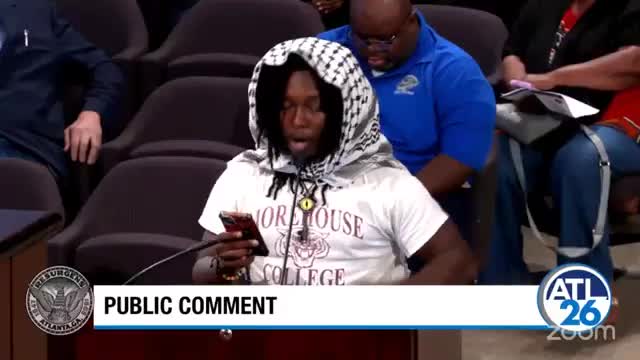Public commentators press Atlanta council for wraparound services, accountability after death of Cornelius Taylor
Get AI-powered insights, summaries, and transcripts
Subscribe
Summary
Multiple residents, advocates and family members urged City Council to fund permanent housing and wraparound services and to halt encampment sweeps after Cornelius Taylor was killed during a clearance. Speakers demanded naming Old Wheat Street for Taylor, immediate services for displaced people and accountability from city departments.
Dozens of people who spoke during public comment at the Oct. 6 Atlanta City Council meeting pressed elected officials to provide permanent housing and wraparound services for people displaced from downtown encampments and to take accountability for the death of Cornelius Taylor.
Speakers described a sequence of events after the Jan. 16, 2025 clearing of an encampment on Old Wheat Street that led to Taylor’s death and said the city’s follow-up has been incomplete. Advocates and relatives said promised services—including consistent meals, case management, transportation and housing placements—have not been fully delivered for people moved to Welcome House and other temporary sites.
Valerie Anderson, who identified herself as the mother of Devon Anderson Jr., demanded answers about her son’s death and said she had not received timely information from city or county authorities. “I wanna know why my son was murdered,” Anderson said, addressing the council and describing a year-long effort to get details about a case she says involves a city officer.
Survivors and advocates described trauma and ongoing needs. “I am the survivor from the Old Wheat Street homeless encampment,” Allen Hall said. He and others said the clearing left residents dispersed and without promised supports. Tim Franzen, who organized petition signatures for the Justice for Cornelius Taylor Coalition, said the group had gathered thousands of signatures requesting a transparent response and full services for displaced residents.
Calls for immediate action and accountability Speakers pressed the council and the administration to take specific steps rather than offer symbolic gestures. Their requests included: - Fund and deliver permanent housing and a full set of wraparound services (meals, health care, addiction support, transportation and case management) before relocating people again. - Stop sweeps/forcible clearings that destroy personal belongings. - Provide a transparent, independent review of the clearance that led to Taylor’s death and publish findings to the public. - Rename Old Wheat Street in honor of Cornelius Taylor and hold a public vigil (organizers planned a vigil for Oct. 8).
“We will hold a vigil on Old Wheat Street this Wednesday, Oct. 8 at 7 p.m. to remember Cornelius Taylor on what would have been his birthday,” said Jonathan Holly, a coalition member, and urged council members to act.
Public-health and policy framing Speakers framed the issue as both a public-health and human-rights crisis. Frank Beauvais, a retired CDC epidemiologist, stressed evidence-based “housing first” responses and argued that displacing people without stable housing is costly and ineffective. He told the council that guaranteed permanent housing with integrated services is cheaper and more humane than repeated sweeps and emergency placements.
Several speakers criticized how the city and its contractors implemented moves and the pace of follow-through. Tim Franzen and other advocates told the council that transportation, meals and case management commitments were delayed or incomplete when people were moved to Welcome House and other temporary sites.
Responses from council members Several council members asked to be kept involved and pledged to seek information. Council member Byron Amos and others spoke with public commenters about next steps; Council member Antonia Lewis offered to seek an update from the Atlanta Police Department for Valerie Anderson. Council member Andrea Boone described prior efforts to expand case management and said she had spoken with individuals on the ground.
No formal new policy was adopted during the Oct. 6 meeting. Public comment concluded with council members acknowledging the urgency and pledging follow-up conversations with city staff, Fulton County officials and public-safety leaders.
Why it matters: Speakers said the city’s response in the run-up to the 2026 FIFA World Cup would be evaluated on whether it honors the dignity and safety of unhoused residents. Advocates warned that short-term “cleanups” ahead of high-visibility events could repeat harms unless the city secures permanent housing and services now.
Speakers and organizations (selected) - Lonnie Joseph White IV, “Think Peace Scribe,” public library worker and activist (Justice for Cornelius Taylor Coalition) - Valerie Anderson, mother of Devon Anderson Jr. (public commenter demanding information about her son’s case) - Allen Hall, survivor from Old Wheat Street encampment - Tim Franzen, organizer and petition coordinator (Justice for Cornelius Taylor Coalition) - Frank Beauvais, retired CDC epidemiologist (public-health framing) - Kat Leatherwood, East Atlanta resident and Justice for Cornelius Taylor Coalition member - Jonathan Holly, coalition member (announced vigil)
Clarifying details cited during comments - Date of incident: several speakers said Cornelius Taylor died Jan. 16, 2025, during an encampment clearing. - Local counts: A city survey cited by a speaker identified nearly 3,000 people in shelters or unsheltered in Atlanta; family and advocates urged funding far beyond short-term placements. - Coalition demands: community groups presented petitions with several thousand signatures and asked for concrete commitments on housing and wraparound services before any further clearings.
Provenance: Public comments on this subject began in the meeting transcript with Lonnie White’s remarks (timestamp 01:57:19) and continued through multiple speakers into early afternoon public comment (see transcript entries). The coalition organized multiple speakers and announced a public vigil for Oct. 8 in memory of Cornelius Taylor.
What’s next: Council members acknowledged the demands and pledged to seek updates from city departments and Fulton County. Advocates said they will continue public pressure including vigils and formal requests for an independent review.
